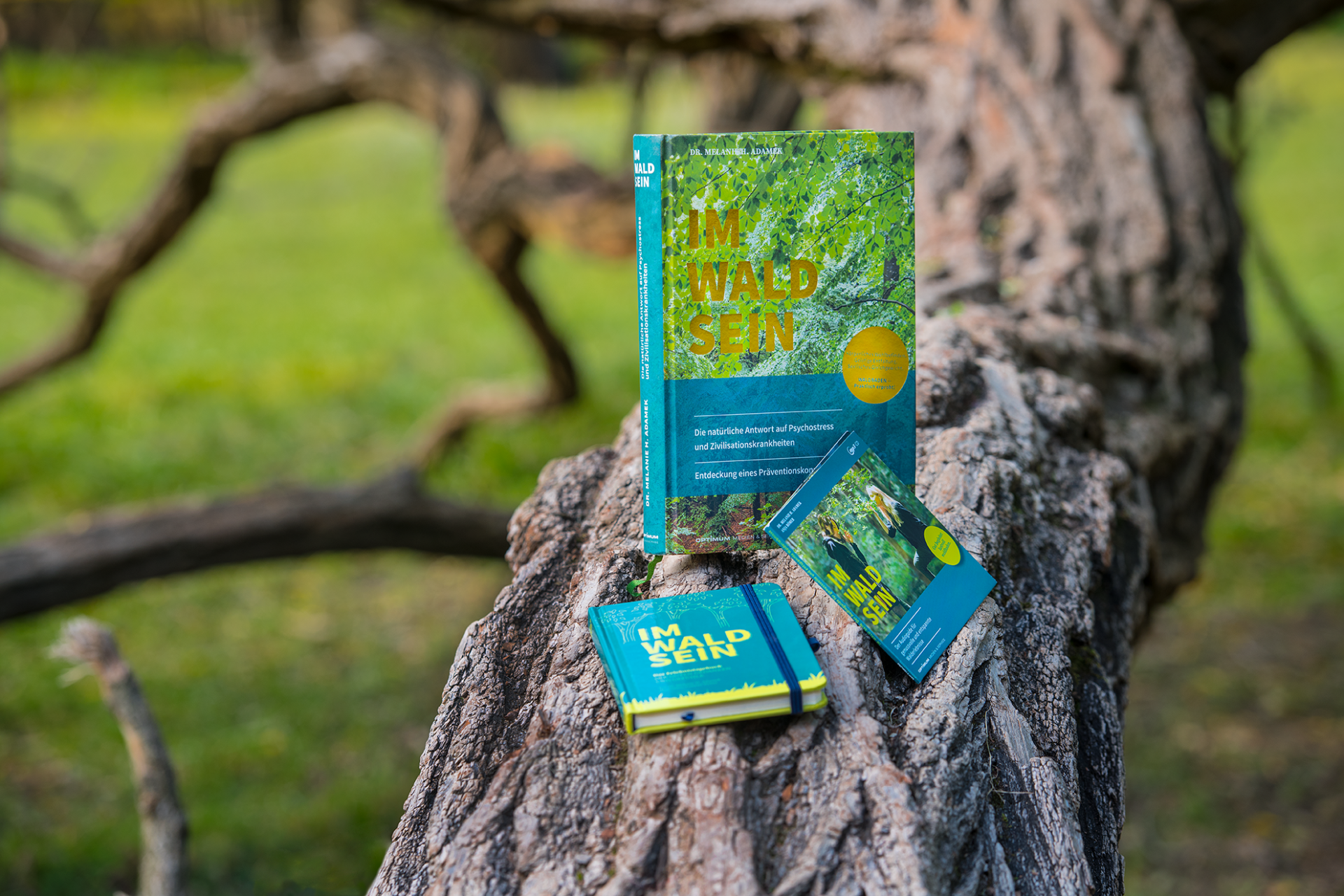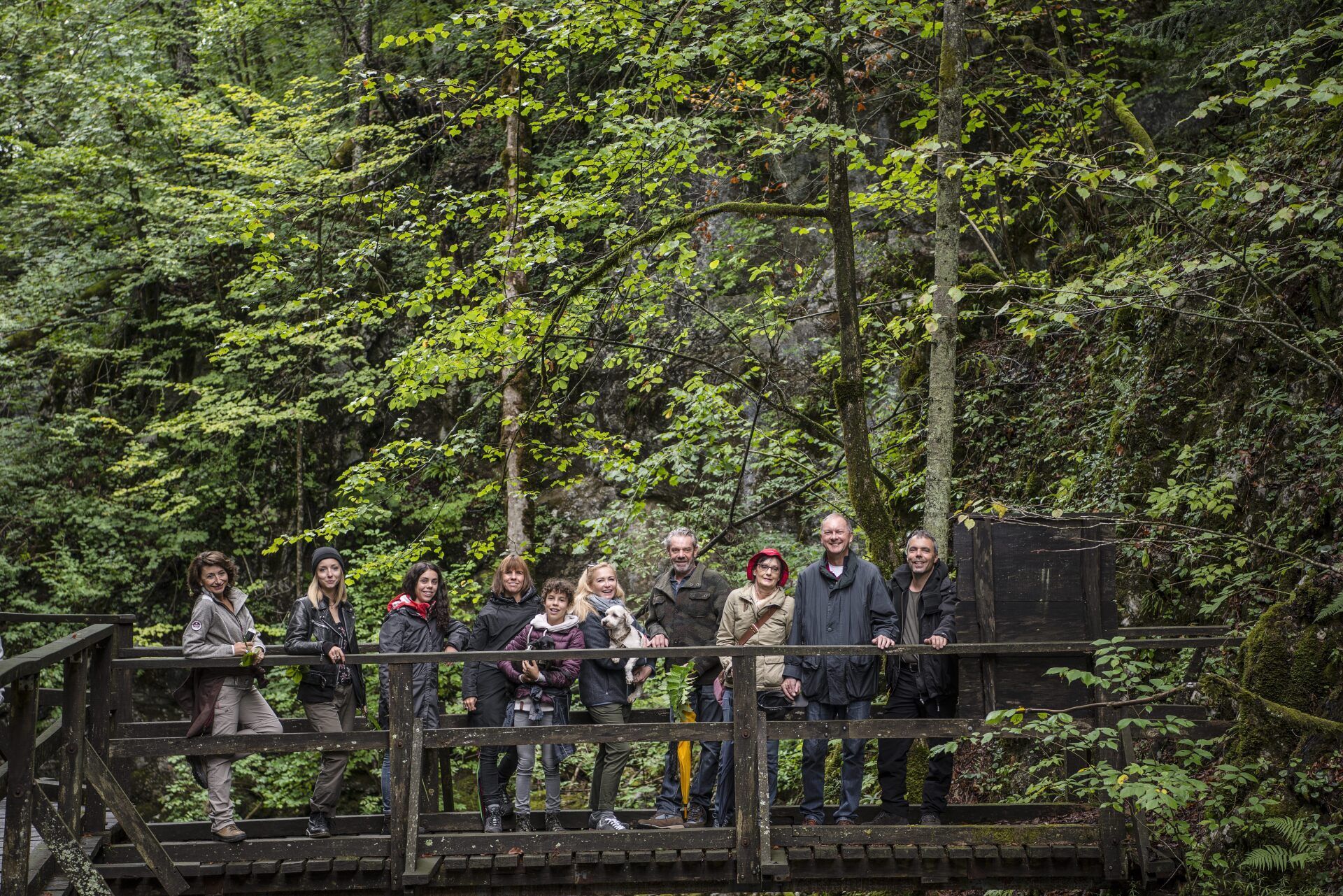Official website of Prof. Dr. Qing Li|李 卿
"FROM FEELING TO SCIENCE"
He is the iconic expert regarding the evidence-based link between forests and health. With his ground-breaking research, Prof. Dr. Qing Li is responsible for turning the pleasurable experience of spending time in the forest, known as Shinrin Yoku, from a feeling into a science.
The immunologist Dr. Qing Li (MD, PhD), clinical professor at the Department of Rehabilitation Medicine, Nippon Medical School Hospital, is regarded as the founder of the research field of forest medicine. This interdisciplinary science explores how spending time in the forest can improve health and well-being.
Prof. Dr. Qing Li has been a member of the IM-WALD-SEIN Academy since 2019 and gives exciting lectures on the amazing results of his Forest Medicine research and the diverse effects of Shinrin Yoku on body, mind, and soul.
Forest Medicine: from feeling to science|Prof. Dr. Qing Li in conversation with Dr. Melanie H. Adamek
Dr. Qing, you are the driving force and figurehead of the forest medicine research field. How did it all begin?
I have loved nature and forests since I was a child. I was born in a small village in China. In my village, there were green poplar forests and a beautiful apricot forest that bloomed pink throughout April. I came to Japan in 1988 and studied at Kagoshima University. At that time, my friends and I visited a very beautiful, mysterious green forest on Yakushima, a small round island.
The quiet atmosphere, the beautiful scenery, the mild climate, the particularly good smells, the fresh, clean air in the forest, and the large Japanese cedars and Jomon Sugi made me very happy and relaxed. I was grateful for all its abundance and beauty.
I came to believe that being in the forest is absolutely necessary for human health. This fascinating and inspiring visit had an important impact on the entire direction of my life and future research.
The healing power of therapeutic landscapes is being researched in many professions. Sociologists, psychologists, biologists, and others. The topic is still largely unknown in the medical profession. After all, you are a medical doctor.
Actually, my major is environmental medicine. I graduated from Kagoshima University with my PhD in 1992 and then moved to Tokyo. During my education at Kagoshima University and Nippon Medical School, I studied the effects of environmental chemicals, stress, and lifestyle on immune function and human health. From 2001 to 2002, I conducted research at Stanford University on anti-cancer proteins such as granulysin in humans’ natural killer cells (immune cells).
As I am interested in the effects of all environmental factors on human health, I am, of course, also interested in the effect of forest environments on human health. I want to know why we feel so much better when we are in forests. What is this secret power of trees that makes us so much healthier and happier? How is it that we feel less stressed and more energetic when we immerse ourselves in the atmosphere of the forest?
When the Japanese Forestry Agency put together the team for their big Shinrin Yoku project in 2004, I was invited as a main member of the project team due to my specialist background.
The aim of Japanese Shinrin Yoku research was to establish being in the forest on a scientifically sound footing. In Germany, forest bathing is often regarded as esoteric. What do you say to your critical colleagues, in particular?
Yes, indeed, when I see how Shinrin Yoku is performed sometimes and what is offered under the label of forest bathing, I could almost get the same impression (*laughs*). But it's actually about a scientifically justifiable fact.
Before studying forest medicine, I developed the following hypothesis: It is well known that the immune system, including natural killer cells (NK cells), plays an important role in the defense against bacteria, viruses, and tumors. It is also common knowledge that stress inhibits immune function. It is common sense that spending time in the forest, which individuals perceive as relaxing, can reduce stress.
Therefore, I speculated that Shinrin-Yoku might have a positive effect on immune function by reducing stress. The many studies I have conducted with my research teams since 2004 to investigate the effect of forest environments on human health have provided clear, evidence-based proof of this.
Yes, the proof is absolutely fascinating, and we are delighted that you, as a member of the IM-WALD-SEIN Academy, are offering various lectures on "Shinrin Yoku by Dr. Qing Li" for medical professionals. What can listeners expect?
At a time when people tend to expect too much from medicine and too little from themselves, doctors and medical professions have a great responsibility, especially in rehabilitation. It is increasingly important to encourage people to take responsibility for their own health with simple and enjoyable measures and resources.
In my lectures, I emphasize the importance of Shinrin Yoku in complementary medicine. I also provide doctors and medical professionals with the necessary background knowledge to give their patients appropriate behavioral recommendations.
The complementary IM-WALD-SEIN® method provides practitioners and patients with everything they need to make the best possible use of the health-promoting, salutogenic effects of a stay in the forest for their own lifestyle and health. A unique approach.
Prof. Dr. Qing Li|Vita
"Some people study forests.
Some people study medicine.
I studied forest medicine to find out all the ways in which being in the forest can improve our well-being."
The immunologist Dr. Qing Li (MD, PhD) works as a clinical professor at the Nippon Medical School Hospital, Department of Rehabilitation Medicine. He is considered the founder of Forest Medicine. This interdisciplinary science explores how spending time in the forest can improve health and well-being.
Functions and memberships
- Founding member of the Japanese Forest Therapy Society (JFTS)
- President of the Japanese Society of Forest Medicine (JSFM)
- Vice President and Secretary General of the International Society of Nature and Forest Medicine (INFOM)
- Leading Member of the Task Force on Forests and Human Health of the International Union of Forest Research Organizations (IUFRO)
- Executive Vice-Chairman of the Forest Health Maintenance Research Committee of the World Federation of Chinese Medicine Societies (WFCMS)
- Board member of the World Society on Forests and Parks for Public Health (WSFPPH)
- Board member of the
IM-WALD-SEIN Academy (IWSA) and the
IM-WALD-SEIN Institute for Forest Medicine and Forest Therapy (IWSI)
Prof. Dr. Qing Li|Selection of publications
Reports and interviews
Prof. Dr. Qing Li inspires the media and is a sought-after interview partner.
Video: Prof. Dr. Qing Li shares insights into the science and practice of forest bathing
In
The Art and Science of Forest Bathing, Dr. Qing Li explores the scientific and cultural foundations of Shinrin-Yoku. He shows how mindful time in nature can nurture body, mind, and spirit, ease stress, and promote overall well-being. With evocative imagery, the film blends research and inspiration into an invitation to experience the forest’s healing power firsthand.
Video: Prof. Dr. Qing Li offers insights into the INFOM training in Forest Medicine
Research indicates that the loss of biodiversity, urbanization, excessive hygiene, and overly sterile environments can disrupt the gut microbiome — especially in children — weakening the immune system and increasing susceptibility to chronic diseases. Many modern lifestyle illnesses, including asthma, diabetes, obesity, depression, and Alzheimer’s, appear to stem from this loss of natural diversity, leading to microbial imbalance, immune dysregulation, and low-grade inflammation.
The
ARTE-Doku Die Macht der Mikroben (Oktober 2024), The Power of Microbes, vividly explores the health impacts of declining microbial diversity in our increasingly germ-free world. Because microbes are often viewed as dangerous pathogens, we try to eliminate them — though 99 percent are essential for life. From minute 1:18 onward, filmmaker Marie-Monique Robin highlights the work of Prof. Dr. Qing Li and the
INFOM seminar on Forest Medicine under the theme of sylvotherapy. A truly fascinating segment!
Video: Enhancing well-being through the relaxing experience of the forest
In October 2020, Dr. Qing Li spoke with AMI (Accessible Media Inc., Toronto) about the history, science, and introduction of Shinrin-Yoku in Canada. His insights highlight how mindful immersion in the forest atmosphere can strengthen both body and mind. The key, he explains, is to be fully present — to engage all the senses and let the healing power of forest air and ambiance take effect. In this spirit, the IM-WALD-SEIN Institute, together with Prof. Dr. Li, has developed a practical approach that helps people step out of the daily grind and experience the restorative energy of the forest with all their senses.
Scientific papers
Prof. Dr. Qing Li has published well over 90 English-language scientific articles over the course of his career. Professor Dr. Qing Li has published over 90 scientific articles in English throughout his career. An overview can be found
here. A German-language version of the publication list is available upon request by email.
Serviceliste
-
Li Q, Ochiai H, Ochiai T, Takayama N, Kumeda S, Miura T, Aoyagi Y, Imai M. Effects of forest bathing (shinrin-yoku) on serotonin in serum, depressive symptoms and subjective sleep quality in middle-aged males. Environ Health Prev Med. 2022;27:44
The study investigates the effects of a forest bathing program on serotonin levels, depressive symptoms and subjective sleep quality in middle-aged males. It shows that forest bathing can have positive preventive effects on depressive status.
-
Li Q. Effects of forest environment (Shinrin-yoku/Forest bathing) on health promotion and disease prevention - the Establishment of "Forest Medicine". Environ Health Prev Med. 2022;27:43
This paper is regarded as a key work in the establishment of Forest Medicine. It provides scientific evidence demonstrating how regular exposure to forest environments can enhance human health and help prevent disease.
-
Li, Q. New Concept of Forest Medicine. Forests 2023, 14, 1024
Based on the most recent research, in this review Dr. Qing Li proposes a new concept of forest medicine that considers the psycho-neuro-endocrine and immunological network.
-
Conte, A., Pace, R., Li, Q. et al. Aula Verde (tree room) as a link between art and science to raise public awareness of nature-based solutions. Sci Rep 14, 2368 (2024)
The study presents the concept of Aula Verde: a “tree room” that integrates art, science, and citizen participation to make nature-based solutions (NBS) visible and tangible in urban spaces. Its goal is to foster environmental awareness and strengthen the connection between people and nature.
-
Benedetti, V.; Giganti, F.; Cotugno, M.; Noferini, C.; Gavazzi, G.; Gronchi, G.; Righi, S.; Meneguzzo, F.; Becheri, F.R.; Li, Q.; et al. Interplay among Anxiety, Digital Environmental Exposure, and Cognitive Control: Implications of Natural Settings. Behav. Sci. 2024, 14, 323
The study shows that virtual natural environments can enhance cognitive control and attention — particularly in individuals with higher anxiety levels. While digital urban scenes tend to impair cognitive performance, virtual forests promote calmness and concentration. The findings highlight the potential of digital nature experiences to foster mental balance and well-being.
-
Simpattanawong, D., Li, Q., & McEwan, K. (2024). A controlled trial comparing the impact of guided forest bathing or a mindful urban walk on heart rate, blood pressure, and mood in young Thai adults. People and Nature, 00, 1–10
Most Forest Bathing (FB) research compares FB with a non-active control of unguided urban walking, finding improved health and well-being in FB but not the urban condition. This controlled trial offers a unique and robust comparison of guided FB with an active control of guided mindful urban walking. This is also the first study testing the acceptability and effectiveness of guided FB in Thailand.
-
Li, Q. Preventive Effects of Forest Bathing/Shinrin-Yoku on Cardiovascular Diseases: A Review of Mechanistic Evidence. Forests 2025, 16, 310
The review demonstrates that forest bathing (Shinrin-Yoku) can have preventive effects by reducing stress, lowering blood pressure, and strengthening the cardiovascular system. Exposure to natural environments supports the balance of the autonomic nervous system and mitigates inflammatory processes, thereby protecting the heart and blood vessels. At the same time, the study emphasizes the need for long-term, controlled research to further substantiate these health-promoting mechanisms.
-
Li Q, Takayama N, Katsumata M, Takayama H, Kimura Y, Kumeda S, Miura T, Ichimiya T, Tan R, Shimomura H, Tateno A, Kitagawa T, Aoyagi Y, Imai M. Impacts of Forest Bathing (Shinrin-Yoku) in Female Participants with Depression/Depressive Tendencies. Diseases. 2025 Mar 28;13(4):100
The pilot study involving 31 women shows that forest bathing significantly alleviated depressive symptoms compared to city walks — an effect that persisted even one week later. After the forest sessions, blood levels of serotonin (in participants not taking antidepressants), oxytocin, and IGF-1 increased, while mood, fatigue, and sleep quality improved markedly. The findings provide initial scientific evidence for the potential of Shinrin-Yoku as a complementary approach to prevent and support the treatment of depressive conditions.
-
Li Q, Takayama N, Kimura Y, Takayama H, Kumeda S, Miura T, Kitagawa T, Aoyagi Y, Imai M. Forest bathing improves inflammatory markers, SpO2, and subjective symptoms related to chronic obstructive pulmonary disease (COPD) in male subjects at risk of developing COPD. J Occup Health. 2025 Jan 7;67(1):uiaf041
The study shows that forest bathing in men at increased risk of COPD reduces inflammatory markers and improves oxygen saturation. In addition, respiratory symptoms, fatigue, and mood improved significantly compared to urban exposures. The findings support forest bathing as a complementary preventive approach for respiratory health.
-
Li Q, et al. Forest bathing enhances human natural killer activity and expression of anti-cancer proteins. Int J Immunopathol Pharmacol. 2007;20(2):3-8Listenelement 1
In this paper, the terms Shinrin-yoku and Forest Bathing were used and defined in English for the first time.
-
Li Q, et al. Visiting a forest, but not a city, increases human natural killer activity and expression of anti-cancer proteins. Int J Immunopathol Pharmacol. 2008;21(1):117-27Listenelement 2Li Q, et al. Visiting a forest, but not a city, increases human natural killer activity and expression of anti-cancer proteins. Int J Immunopathol Pharmacol. 2008;21(1):117-27
-
Li Q, et al. A forest bathing trip increases human natural killer activity and expression of anti-cancer proteins in female subjects. J Biol Regul Homeost Agents. 2008;22(1):45-55Listenelement 3Li Q, et al. A forest bathing trip increases human natural killer activity and expression of anti-cancer proteins in female subjects. J Biol Regul Homeost Agents. 2008;22(1):45-55
-
Li Q, et al. Effect of forest environments on psychological response evaluated by the POMS test. In: Li Q (ed): Forest Medicine. Nova Science Publishers, Inc., NY, 2012.2, pp 135-144Listenelement 4Li Q, et al. Effect of forest environments on psychological response evaluated by the POMS test. In: Li Q (ed): Forest Medicine. Nova Science Publishers, Inc., NY, 2012.2, pp 135-144
-
Li Q, Kobayashi M, Kawada T. Relationships between percentage of forest coverage and standardized mortality ratios (SMR) of cancers in all prefectures in Japan. The Open Public Health Journal 2008; 1, 1-7Li Q, Kobayashi M, Kawada T. Relationships between percentage of forest coverage and standardized mortality ratios (SMR) of cancers in all prefectures in Japan. The Open Public Health Journal 2008; 1, 1-7
-
Li Q, et al. Effect of phytoncide from trees on human natural killer function. Int J Immunopathol Pharmacol. 2009;22(4):951-9Li Q, et al. Effect of phytoncide from trees on human natural killer function. Int J Immunopathol Pharmacol. 2009;22(4):951-9
-
Li Q et al. A day trip to a forest park increases human natural killer activity and the expression of anti-cancer proteins in male subjects. J Biol Regul Homeost Agents 2010;24(2):157-65Li Q et al. A day trip to a forest park increases human natural killer activity and the expression of anti-cancer proteins in male subjects. J Biol Regul Homeost Agents 2010;24(2):157-65
-
Li Q. Effect of forest bathing trips on human immune function. Environ Health Prev Med. 2010 Jan;15(1):9-17Li Q. Effect of forest bathing trips on human immune function. Environ Health Prev Med. 2010 Jan;15(1):9-17
-
Li Q et al. Acute effects of walking in forest environments on cardiovascular and metabolic parameters. Eur J Appl Physiol 2011;111(11):2845-53Li Q et al. Acute effects of walking in forest environments on cardiovascular and metabolic parameters. Eur J Appl Physiol 2011;111(11):2845-53
-
Ochiai H, Ikei H, Song C, Kobayashi M, Takamatsu A, Miura T, Kagawa T, Li Q, Kumeda S, Imai M, Miyazaki Y. Physiological and psychological effects of forest therapy on middle-age males with high-normal blood pressure. Int. J. Environ. Res. Public Health 2015;12(3):2532-42Ochiai H, Ikei H, Song C, Kobayashi M, Takamatsu A, Miura T, Kagawa T, Li Q, Kumeda S, Imai M, Miyazaki Y. Physiological and psychological effects of forest therapy on middle-age males with high-normal blood pressure. Int. J. Environ. Res. Public Health 2015;12(3):2532-42
-
Li Q et al. Effects of Forest Bathing on Cardiovascular and Metabolic Parameters in Middle-Aged Males. Evid Based Complement Alternat Med. 2016;2016:2587381Li Q et al. Effects of Forest Bathing on Cardiovascular and Metabolic Parameters in Middle-Aged Males. Evid Based Complement Alternat Med. 2016;2016:2587381
Books
His specialist publications have been groundbreaking; his book “Forest Bathing” was an overnight bestseller in the USA. The book has also been translated into countless languages.
Books by Prof. Dr. Qing Li
-
Forest Medicine, Qing Li (Editor)Listenelement 1Series: Public Health in the 21st Century, Environmental Health – Physical, Chemical and Biological Factors. Published: February 2012. Nova Science Publishers. Translations into Chinese and Korean
-
Shinrin-YokuListenelement 2Shinrin-Yoku. The Art and Science of Forest Bathing – How Trees Can Help You Find Health and Happiness (UK-Version). Erschienen: April 2018, Penguin Random House
-
Forest BathingListenelement 3Forest Bathing. The Japanese Art and Science of Forest Bathing – How Trees Can Help You Find Health and Happiness (USA-Version), Erschienen: April 2018, Viking Books
-
The valuable medicine of the forestListenelement 4The valuable medicine of the forest. How nature strengthens the body and mind. Published: June 2018, Rowohlt
-
Shinrin YokuShinrin Yoku. Japanese version. Published: November 2020. Hanmoto
-
International Handbook of Forest Therapy, Qing Li (Co-Editor)
Symposium 2022|The role of forest medicine in post-COVID-19 health management and disease prevention
ポストコロナの健康管理・病気予防に対する森林医学の役割
JSH Award for Prof. Dr. Qing Li: Forest medicine officially recognized as a new field of Japanese preventive medicine
From the 21st to the 23rd of March 2022, the 92nd Annual Meeting of the renowned Japanese Society of Hygiene was held as a hybrid face-to-face and online event, along with the symposium "The role of forest medicine in post-COVID-19 health management and disease prevention". → Program
Renowned international experts gave important insights into the significance of forest medicine in the treatment of post-COVID-19 patients. The German delegation consisted of Dr. Melanie H. Adamek, Dr. Volker Liefring, and Christian Poklitar, with the topic "The role of forest medicine in post-COVID-19 health management and disease prevention in Germany." → Abstracts
This year's Society Award, presented by the Japanese Society of Hygiene, was awarded to Prof. Dr. Qing Li for his groundbreaking research into the health-promoting and disease-preventing effects of forest environments (keywords: shinrin yoku, forest bathing) and the establishment of forest medicine.
This award convincingly demonstrates that forest medicine is recognized by the medical community as a new form of preventive medicine.











